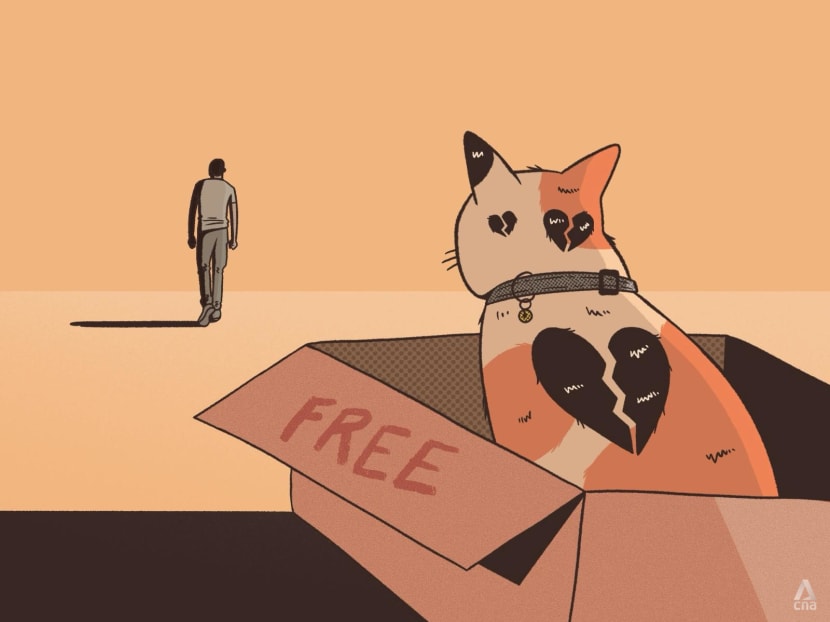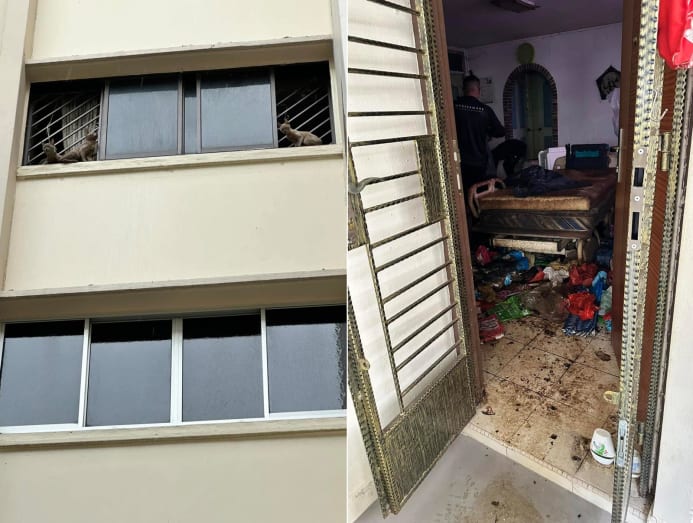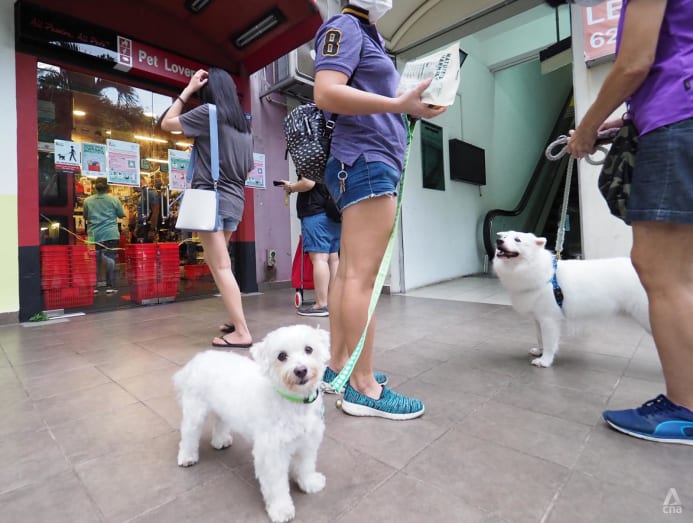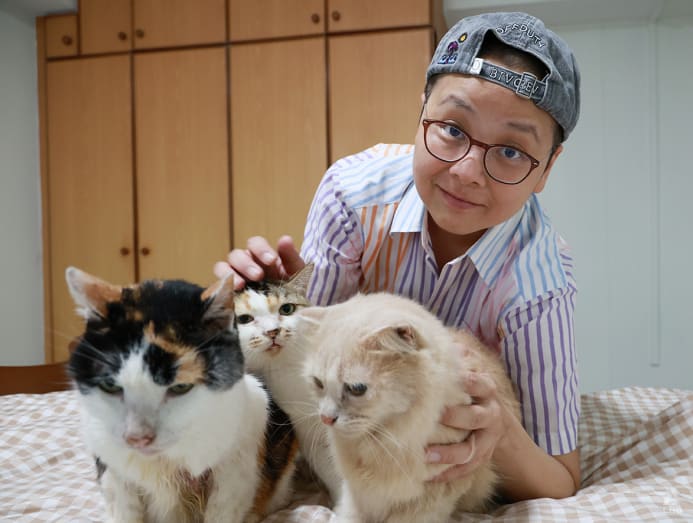Too cheap and easy to buy: What's fuelling the rise of pet abandonment and how to address it
Some countries are banning retail sales of pets to curb impulse buying that could lead to abandonment and neglect. Is it time for Singapore, where so many abandoned animals are waiting to be rehomed, to consider such a move too?

The Society for the Prevention of Cruelty to Animals said that it had received 114 reported cases of pet abandonment as of Nov 25, 2024. (Illustration: CNA/Nurjannah Suhaimi)

This audio is generated by an AI tool.
Returning home from work one day early this year, Mr Bryan Ng, a designer in his late 20s, was surprised to find “two new moving additions” in his toilet.
It turned out that an acquaintance of his parents' was moving house and did not want to take their pet terrapins with them.
“One day, he decided to bring a small glass jar containing two red-ear sliders to my doorstep without any prior consultation with my father,” said Mr Ng.
His father had then temporarily placed the two terrapins on their bathroom floor.
“I don’t think (the previous owner) was a serious pet owner, because he wasn’t even able to tell me basic details like their names or age,” Mr Ng recalled.
As Mr Ng knew that he would not be able to provide the new turtles with proper care as he already had two of his own, he put up the “surprise turtles” for adoption, and managed to find a new home for them.
While the two abandoned terrapins had a happy ending, a group of cats at Bedok Reservoir Road were not so lucky.
Over the course of three days last week, Ms Reyn Tang and a neighbour found a few kittens, either injured or dead, at a block in the vicinity.
While waiting for officers from the National Parks Board (NParks) to arrive, “another cat fell with a loud sound right in front of me”, she wrote in a Facebook post.
Ms Teng and the other resident managed to identify the unit where the cats were from, and following intervention from the authorities and the Society for the Prevention of Cruelty to Animals (SPCA), they entered the flat — and were shocked by what they saw.
The 42-year-old manager who works in the education industry said that she had contacted the authorities because she wanted them to contact the flat owner and ask the latter to shut their window.
“But the scene I saw when I entered the house is something I won’t be able to forget. I didn’t expect the situation inside that unit to be that bad,” she told CNA TODAY.
The house was littered with rubbish and cat waste, and SPCA later described the unit as “severely derelict”.
Apart from 12 live cats, three cat carcasses were found in the unit. The case is currently under investigation by NParks for alleged neglect.

Pet ownership is becoming increasingly popular in Singapore. The population of pet cats, dogs, birds and small mammals has risen from about 412,000 in 2023 to 415,000 this year, and is projected to grow to 416,600 next year, according to figures shared with CNA TODAY by data analytics firm, Euromonitor International.
Ms Jessica Kwok, group director at Animal & Veterinary Service (AVS), a cluster of NParks, told CNA TODAY that there has been an approximate 30 per cent increase of pet imports into Singapore year-on-year since 2019.
Meanwhile, the number of pet shops here has also gone up — 267 in 2019, 362 in 2022 and at 347 as of November this year.
Many owners consider their pets a member of the family and spend lavishly on their comfort. But at the same time, figures also point to a worrying trend of irresponsibility among some others.
SPCA told CNA TODAY that it had received 114 reported cases of pet abandonment as of Nov 25, following the 137 cases it received in 2023, which it had described as “alarming”.
Cases in preceding years were only in the double digits.
“Unfortunately, data across the past five years suggests that the spike in 2023 is unrelenting,” said SPCA’s executive director Aarthi Sankar.
Last year SPCA also received the highest number of reports of animal cruelty and welfare issues in 11 years, at 915. Of these, about 61 per cent were welfare and neglect cases, which mostly involved the pet owners themselves.
From January to November this year, NParks received around 800 cases of alleged animal cruelty and abuse, including cases of pet abandonment, said Ms Kwok.
Animal welfare groups, rescuers and pet owners cited the low barriers to buying pets, as well as a mismatch between the expectations and realities of owning such animal companions, as among the underlying causes for these worrying trends.
To tackle the problem, they suggested tightening requirements for pet purchases at retail shops – though perhaps not to the extent of imposing a ban, which countries such as the United Kingdom and France have done.
As the festive season has traditionally been the peak period for both pet abandonment and pet purchases, CNA TODAY takes a deeper look at the issue.
RESCUERS OVERWHELMED BY PET ABANDONMENT, REHOMING CASES
Ms Kwok of AVS said that NParks investigates all feedback it receives about animal cruelty, abuse and abandonment.
From 2019 to 2023, NParks received an average of about 1,250 cases on allegations of animal cruelty and abuse annually. From January to November 2024, around 800 of such cases were received, including cases of alleged pet abandonment, she said.
“We investigated each of the cases and found that an average of about 4 per cent of cases each year were actually related to animal cruelty and abuse.”
The high number of cases of pet abandonment is overwhelming animal welfare groups and individuals who care deeply about animal rights — all of whom have long been grappling with various challenges.
Ms Betty Tan, vice-president of the House Rabbit Society of Singapore (HRSS), said that although the overall number of rehoming and abandonment cases referred to her group remained roughly the same, they could only take in 44 rabbits this year, down from last year's 84, because they were overwhelmed.
“This year, HRSS had to manage our resources in taking (cases) due to many of our rabbits falling sick due to old age or illness and needing more care from our volunteers,” she said.
A spokesperson from the Parrot Society Singapore (PSS) said it has received over 80 welfare-related cases so far this year, such as abandonment and owners wanting to rehome their birds, double from last year.
“As we have been facing a resource crunch, we have had to reject a large number of surrender requests and prioritise urgent and more serious cases,” the spokesperson said. Instead, the PSS provided guidance to the owners in non-urgent cases to undertake the rehoming on their own.
This is only PSS' second year of operation, so they were reluctant to describe the rise in welfare-related cases as a “trend”, as it may be due to rising awareness among members of the public of the group’s existence.

SPCA also receives requests by pet owners to rehome their pets, on top of the abandonment cases it recorded. Such requests "far surpass the number of adoptions” that the group handles, said Ms Aarthi.
According to its latest annual report, SPCA handled 786 adoptions for the 12-month period until end-June 2023.
NEGLECT, ABUSE AND IRRESPONSIBLE OWNERSHIP
Singapore has seen a significant number of neglect and abuse cases involving pet owners in recent years, data shows.
In response to Workers’ Party Member of Parliament He Ting Ru’s questions on animal cruelty and welfare in September, the Ministry of National Development said that between 2019 and 2023, there were between 800 and 1,000 cases annually specifically related to a failure in duty of care.
Of these, 179 cases have resulted in enforcement action so far, with investigations still ongoing for some cases. Enforcement action refers to an issuance of a warning letter, a composition fine or a prosecution in court.
Ms Kwok of AVS told CNA TODAY that of cases that turned out to be unrelated to animal cruelty and abuse, investigations found that most arose from disputes or disamenities caused by pets or community animals.
The cases may also include deaths of community animals due to non-cruelty reasons like accidental falls from height, fights among community animals or road traffic accidents.
Meanwhile, several animal abuse cases made headlines in Singapore this past year.
In April, a man was jailed for 20 days for neglecting 43 cats in a flat – the first time a jail sentence was imposed for a conviction related to neglect under the Animals and Birds Act.
Last month, a domestic helper was sentenced to nine months’ jail after a dog under her care, which she had beaten, died.
Court documents showed that the maid had received instructions from her employer, a 37-year-old woman named Heng, to treat the poodle separately from her two other dogs. This included instructions to hit the dog and hang it up.
The authorities said that they were assessing if any other person should be prosecuted in this case.
Irresponsible pet owners not only bring grief to the animals, but often to other humans, too.
The Housing and Development Board (HDB) told CNA TODAY previously that it had received over 1,000 cases of cat-related feedback each year since 2020.
“The majority of the feedback was related to irresponsible pet ownership and disamenities caused by the cats, such as defecating in common areas,” said a spokesperson last December.
In September this year, the Ministry of Sustainability and Environment (MSE) revealed in response to WP MP Gerald Giam’s parliamentary question that it had received about 670 cases of feedback on pet defecation and urination around HDB estates this year. Only one enforcement action was taken, as the “transient nature of the offence” makes enforcement challenging.
In November, a Singaporean man was fined S$4,500 for not leashing and muzzling his bull terrier dog that had attacked and injured another dog belonging to a member of the public.
Anyone convicted of failing in their duty of care to their pets can face a maximum fine of $10,000, a jail term of up to 12 months, or both.
Those found guilty of committing animal cruelty-related offences can face a maximum fine of $15,000, a jail term of up to 18 months, or both.
Repeat offenders can be subjected to stiffer maximum punishments.

PET DISOWNED AS IT ‘DOES NOT LIKE’ OWNER
While some owners are sparing no expense to pamper their furkids, why are others neglecting, abusing or abandoning the very animals that they had brought into their homes?
Ms Lanie, 38, was given two terrapins by her sister sometime in September as her sister faced some personal difficulties in caring for them. Ms Lanie then bought another terrapin so each of her three children could have a pet of their own to take care of.
“It was not just easy to get the terrapins, they were very cheap too. They were about S$8. There wasn’t any education given by the shop,” said the financial adviser who did not want to give her full name.
Five other pet owners told CNA TODAY they had similar experiences when buying small pets from stores — quick, fuss-free with no questions asked on whether they knew how to take care of the animals they were buying.
For Ms Lanie, things were all well and good until she returned from a one-month trip recently to terrapins that had grown so fast it caught her by surprise — they had doubled in size in roughly three months.
The family had already changed the tanks twice before her trip to accommodate the growing size of the turtles, she said
“I started to research the life span of terrapins. They can live up to 50 years, which surprises me. They probably will outlive me.”
Ms Lanie said she is now looking to give up the terrapins to someone who lives in a bigger house and can provide more space for them.
Her situation highlights two key factors driving many others to give up their pets, said animal lovers and pet welfare groups: The relative ease of buying such pets and insufficient knowledge or preparation by prospective owners.
These factors apply especially in the purchase of smaller animals, whose tiny size make them extra attractive to children and cause some prospective owners to underestimate the actual commitment needed to care for such pets.
“They often forget that taking care of them when they are ill or old is part of the package,” said Ms Tan of HRSS.
“Particularly, this happens to owners who are inadequately informed at the point of purchase or adoption, pet shops usually do not prepare them beyond the purchase.”
Agreeing, Little Hammy Rescue Singapore (LHRS) said owners’ commitment is often tested when the animals fall sick, as treatment can run into thousands of dollars.
“The owners then choose to ‘dispose’ of the $20 hamster rather than pay for its treatment,” said the group's president Xylvie Wong and team member Tan Wei Wei.
Changes in one’s life circumstances might also prompt some owners to give up their pets.
Ms Ten Hui Yu, an associate director at a financial advisory firm who has been volunteering at a cat shelter for about eight years, said there have been people asking the shelter to take in their pets because they had just welcomed a newborn.
Part-time make up artist and cat-sitter Lynn Jefrey recalled a few years ago seeing a man releasing a cat from a carrier in public, before heading to a nearby hawker centre for a meal.
"When I confronted him, he brushed it off saying that he had brought home the cat for his kids to play with for a few weeks, but his wife disliked the cat," said the 45-year-old, who has been feeding community cats regularly and fostering old and sick cats for years.
Ms Lynn ended up bringing home the newly abandoned cat and found an adopter for it.
The animal groups and volunteers have also encountered cases where owners underwent more drastic life changes, such as financial hardship or the main pet caregiver passing away, and felt hard-pressed to rehome the pets.
But there is also no shortage of those who want to give up their pets for more frivolous reasons.
Ms Tan and Ms Wong of LHRS said the organisation has come across reasons such as children no longer liking the hamsters the parents bought for them, and because hamsters bite.
“One more reason we encountered: ‘The animal communicator told me that my hamster doesn’t like me’,” they said.
A PSS spokesperson said owners have approached the group to give up their pets because they were “giving up their ‘parrot hobby’” or they wanted to “upgrade” to larger species of parrots.
“We would like to emphasise that keeping a parrot should not be seen as a casual hobby, nor should a parrot be treated like a collectible,” the spokesperson added.
Some owners even threaten to abandon or release the animals to the wild if these animal groups do not assist in their rehoming requests.
As for cases of neglect and irresponsibility, the animal welfare groups and pet lovers told CNA TODAY that they often stem from the same root causes of abandonment.
As Ms Ten, the cat shelter volunteer, put it: “I think most of the time… they (irresponsible pet owners) fail to understand or comprehend the amount of responsibility – be it financial, personal or social – it actually takes to be a pet owner until they become one, then they aren’t able to bear that responsibility.”
She has adopted seven ill cats, including four that she cared for until they died.

Dr Teo Boon Han, a veterinarian and pet nutritionist at Canopy Veterinary Centre, said that there can be various psychological, social and situational factors influencing the abuse and neglect of animals.
“There are unfortunately some individuals who are intentionally cruel to animals, or are facing some life stressors and take their frustrations out by abusing them. These individuals should be held accountable to the fullest extent of the law,” he said.
However, Dr Teo believes that such individuals and the serious abuse cases that make the headlines are not a reflection of the general trend of human-animal relationships in Singapore.
“I genuinely believe that some of these perpetrators are true animal lovers at heart, but are perhaps misguided or overestimate their ability to care for animals. Some take on too many animals and overextend, but do not know who to turn to for help,” he added.
WOULD ANIMALS BENEFIT FROM SUPPLY BAN?
A number of countries and cities are strengthening or looking to tighten regulations around pet welfare, such as by restricting pet sales.
The United Kingdom in April 2020 outlawed the sale of puppies and kittens by third-parties – essentially pet shops – “to tackle the low-welfare, high-volume supply of puppies and kittens”.
Prospective owners can now only acquire such pets from licensed, regulated breeders or adopt them from pet shelters.
In Singapore’s case, the Ministry of National Development said in February 2022 that it was “too early” to assess the effectiveness of the UK move in improving animal welfare.
The ministry, which was replying to a parliamentary question by People's Action Party MP Louis Ng, also said that the authorities here will consider regulatory developments in other jurisdictions when reviewing the laws in Singapore.
In France, a similar law to the UK’s kicked in at the start of 2024, in a bid to curb impulse pet buying and reduce abandonment cases.
In light of the current situation in Singapore, some pet lovers and animal groups feel that a similar ban on the sale of pets by “third parties” is worth considering.
Ms Tan of HRSS said that this could possibly nip the issue in the bud, but she, like the other animal welfare experts, worry that such a move could also push aspiring owners to turn to backyard breeders or importing pets illegally.
“The illegal breeding industry is even more of a labyrinth, with breeders operating below the radar and on platforms that evade governance,” noted SPCA’s Ms Aarthi.
“Without clarity (yet) on how the ban can be strictly enforced, imposing such a ban may only serve to drive pet sales underground and make them even harder to regulate.”
Where the pet lovers agreed, though, is that changes need to be made at the point of acquiring the pets – be it at stores or breeders.
Giving the example of parrots, the PSS spokesperson said: “These businesses or individuals should be regulated more strictly to ensure that they are handling the parrots properly.
“They should also provide proper guidance to buyers about parrots' needs and keep traceable records of the sources and health conditions of the parrots they sell.”
Ms Ten, the cat adopter, urged for guidelines to be issued, which must be followed by prospective pet owners before they are allowed to own a pet, be it through purchase or adoption.
“(The guidelines can include) proof of financial capabilities, doing a home visit, microchipping, taking up pet insurance, and so on,” she said.
One pet shop that has made attempts to screen its potential customers is Tiara Pets at Joo Chiat Road, which specialises in selling “teacup” or miniature-sized dogs imported from Japan.
Since its opening in 2022, the shop has made it a point to create a WhatsApp chat group with each customer and the main pet caregivers in the household, said its co-directors Keiko Kawase and Joseph Nathan.
“We send them all the basic information about how to care for the dogs in messages, so they can refer back to them as and when needed,” said Mr Nathan.
His shop also declines prospective clients who want to purchase the dogs by instalment or credit payment, as it does not reflect well on their financial ability to care for the pet in the long run, he said.

Over at Pet Lovers Centre, a spokesperson told CNA TODAY that staff members advise and "actively engage customers in discussions" to ensure the prospective pet owners fully understand the level of commitment needed to care for the pet.
According to latest publicly available information from NParks, over 50 Pet Lovers Centre branches here are licensed to sell live animals, making it the largest pet shop chain here.
Customers buying a live animal are also required a "Pet Sales Contract" which outlines key terms and conditions of the purchase and "explicitly states that the pet owner assumes full responsibility for the care and welfare of the animal", the spokesperson added.
The spokesperson was referring to the Pet Purchase Declaration Form introduced by then-Agri-Food and Veterinary Authority of Singapore in 2014 for the sales of cats, dogs and rabbits.
Meanwhile, Ms Eliza Hong, co-founder of Little Heroes, does not allow walk-in quick sales at her store to minimise the chances of someone buying a pet "on impulse or on a whim".
"Most customers do spend upwards of two hours or more in our shop without interruption, as we are by-appointment only, so we can facilitate proper supervision, question-and-answer, and get an overall sense of whether the chinchillas will go to proper homes," she said.
In fact, a number of the customers are dissuaded from purchasing during the first visit, and instead return a second time with their family members who would then have to agree to commit to a pet before the shop sells one to them.
Singapore has taken steps to strengthen regulations around pet ownership here.
In September, it became mandatory for first-time owners of dogs and cats to attend a pet ownership course before they can attain a licence of ownership.
The authorities have also reversed a long-held ban of keeping cats in HDB flats, and introduced a new framework that covers mandatory licensing and microchipping.
Some animal lovers are calling for such moves – the compulsory ownership course, microchipping and licensing – to be extended to other pets too.
These would go a long way in preparing prospective owners for their responsibility, and help with traceability and accountability should neglect and abandonment still occur, they said.
In the meantime, NParks has embarked on a review of the Animals and Birds Act 1965 and the Code of Animal Welfare, said Ms Kwok.
“The penalty framework under the Act will be reviewed to ensure that it is effective in deterring and punishing acts of animal cruelty and abuse,” she said.
“We will continue to take a collaborative approach in this review and will consult the public and community stakeholders to ensure that their views are considered.”
In the bigger scheme of things, pet groups and owners agreed that much still needs to be done in terms of education – be it through regular roadshows that the groups are already organising, or through schools – to change the public’s mindset on pet ownership instead of viewing them as cheap "commodities" or hobby items.
Ms Suzanne Ng, a senior lecturer at a polytechnic, keeps a pet corgi and had hamsters which her family looked after until the animals' ripe old age.
Most recently, her family just adopted a pet terrapin that they had found abandoned.
"Education on caring for animals from young is important to build a kinder and more responsible society," she said, adding that this should be coupled with strict regulations to deter abandonment and irresponsible pet ownership practices.
"I learnt from my pet dog Max the basic skills of parenthood: Being present, consistent, caring and being responsible. And of course committed," she said.









